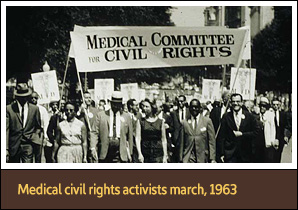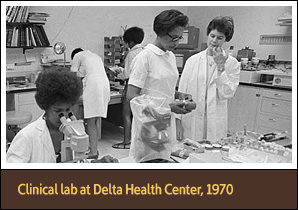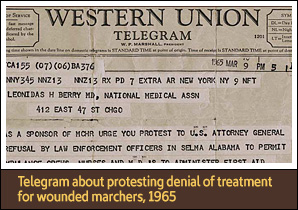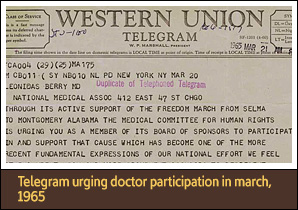ExhibitionCommunity Health Action
Return to Exhibition




- Medical civil rights activists march, 1963

Medical Committee for Civil Rights participates in the March on Washington for Jobs and Freedom, 1963
Courtesy National Library of Medicine
Many physicians, nurses, and medical students worked in the civil rights movement. They marched against segregation, treated people injured in protests, and helped set up community clinics in both the North and the South.
- Clinical lab at Delta Health Center, 1970

Clinical lab at Delta Health Center, Jackson, MS, 1970
Courtesy Daniel Bernstein/Jack Geiger
Shocked at the poor health conditions in the South, physicians from the Medical Committee for Human Rights helped local residents in rural Mississippi open the Delta Health Center, one of the first community-controlled health clinics in the nation.
- Telegram about protesting denial of treatment for wounded marchers, 1965

Telegram to Leonidas Berry from the Medical Committee for Human Rights denouncing police refusal to allow ambulances and physicians to assist the injured at the Selma to Montgomery march, 1965
Courtesy National Library of Medicine
Police temporarily stopped doctors and nurses from treating the injured at the Selma march.
- Telegram urging doctor participation in march, 1965

Telegram from the Medical Committee for Human Rights to Leonidas Berry, MD, president-elect of the National Medical Association, urging physicians to participate in the Selma to Montgomery march for voting rights, 1965
Courtesy National Library of Medicine
Physicians initially joined the Selma, Alabama voting rights protests to offer moral support, but soon found themselves providing first aid to marchers injured by tear gas and beatings.






